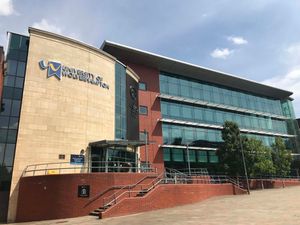'It's a shambles': Wolverhampton University axes 138 courses but is advertising for lecturers
The University of Wolverhampton has confirmed that the courses it "suspended" earlier this year have now been axed and will not be reintroduced.

In May, the university announced that it would not recruit students for 138 courses, many of which were in the arts or performing arts, for the following academic year.
This meant up to 250 jobs were at risk due to restructuring, and up to 100 staff were expected to leave through a mutually agreed resignation scheme (MARS).
And while the university promised students already on the courses would be "taught out", the university is having to advertise for lecturer roles to replace the staff who have already left, as there aren't "enough people to teach the students".
Dr Catherine Lamond, chair of the University and College Union (UCU) negotiating committee at the university, said: "It's a shambles.
"There are adverts out now for lecturers in certain areas because they've realised there aren't enough staff to teach the students they've already got," she said.
"It's really awful - we've lost great colleagues and experts, some of the courses have already started, and they're having to re-hire to fill the positions."
The decision to axe the courses was made amid concerns over a £20 million deficit and a 10 per cent fall in UCAS applications.
Now, staff who have not decided to take MARS are in uncertain waters as they face the risk of compulsory redundancy.
Dr Lamond added: "There are a lot of unhappy and stressed staff, I know quite a few staff members off sick.
"We've had a period of collective consultation into further redundancies. It's really unsatisfactory, most of us had information read to us from a script. We weren't allowed to ask questions unless they were by email and even then we've had no reply."
She added: "It's been hanging over us for a long time. The university has identified teams where want to reduce numbers. People in those pools will be in a competitive process where they will have to fill in a form about why they're great at their job.
"People are dreading it, at having to make out why they're better than their friends.
"Initially, they said people would have interviews instead and that these would involve students - meaning students would be involved in sacking people which would be terrible - so we really pushed back against that.
"People don't feel this is going to be helpful and fair - they're not confident at this stage of the process.
"There's no faith in management, it's quite shocking. Morale is really at rock bottom."
Professor Ian Campbell, the university's interim vice-chancellor, said: “Following the suspension of a number of courses for September 2022 the university has made the difficult decision not to reintroduce them going forward.
"As an institution we have one of the largest course offerings across the sector and we will continue to monitor the economic and regional needs and demands of the Black Country and wider Midlands to ensure our offer is reflective of this.
"We are continuing to proceed with our transformation programme, working closely with our recognised trade unions to ensure a mutually agreed approach to the recruitment selection process for staff impacted by potential job losses and we are, wherever possible, providing opportunities for staff to redeploy into other areas.
"As a university we respect the right for our respective unions to come together to voice their opinions and we will continue to work with them and the wider university community as we move forward with the implementation of our transformation programme."
Wolverhampton's branch of the UCU will stage a protest on Saturday from 2pm to 4pm in front of the Wolverhampton Civic Centre.
Dr Lamond added: "The protest is being supported by the Midlands UCU, and UCU president Janet Farrar is coming to talk at protest. While this is a local dispute, it is recognised as of 'national significance'.
"The Government don't seem to support Higher Education. There's talk of 'Mickey Mouse' courses and courses which don't produce 'highly-paid graduates'.
"But we train nurses and teachers and social workers - these aren't highly paid jobs but we really need them. And all these courses contribute to the local community and to the region.
"We think we're important and valuable but the Government don't support us - they only support the Russell Group universities like Oxford and Cambridge.
"We need unions to support workers. We have people who haven't been treated well and we're heading for a difficult winter."





